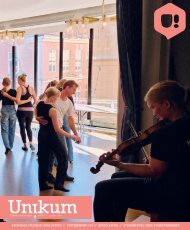DESEMBER_UNIKUM_WEB
You also want an ePaper? Increase the reach of your titles
YUMPU automatically turns print PDFs into web optimized ePapers that Google loves.
My final shot<br />
To sum up, Norway has traditionally opted for strict alcohol regulations and even prohibited most beverages during the early 1910s<br />
and 1920s. According to the statistics, Norway does indeed manage to discourage drinking, as is reflected in one of the lowest alcohol<br />
consumption rates among European countries. However, the SHoT study has shown that a large number of the Norwegian student<br />
population are struggling with responsible alcohol consumption despite the strict regulatory approach.<br />
While linking the revenue of selling alcohol to the welfare system is in my opinion a good approach that should be implemented more<br />
widely across countries, I am not entirely convinced that the harsh regulations, especially regarding opening hours and the prohibition<br />
of consuming alcohol in public places, are the best solutions. Such measures may actually increase the alcohol consumption from<br />
black markets and incentivize the production of homemade alcohol which can be detrimental to health and contradict the goals of the<br />
Alcohol Act. Don’t get me wrong, alcohol can have negative side effects and these should not be dismissed, and awareness campaigns<br />
are important in this regard, but I do believe that the more you restrict something, the more interesting it becomes and as long as people<br />
want to drink alcohol they will find a way to do so and will not be disincentivized by harsh regulations.<br />
References<br />
Act on the Sale of Alcoholic Beverages, etc. (Alcohol Act), (1990).<br />
Bjørnson Hagen, H. (2022, December 6). Flere blir seksuelt trakassert på julebord. Dette gjør du hvis det skjer. Dagsavisen.<br />
Federal Ministry of Health. (2023, September 11). Alkohol. Federal Ministry of Health.<br />
Götestam, K. G., & Röstum, O. (1983). Alcohol Control Policy in the Nordic Countries (Denmark, Finland,<br />
Norway, Sweden, Iceland). In P. M. Miller & T. D. Nirenberg (Eds.), Prevention of Alcohol Abuse.<br />
Hauge, R. (1996). Alkohol i norsk historie. Norsk Epidemiologi, 6(1), 13–21.<br />
Hauge, R., & Lohiniva, R. J. B. L. (2001). Bevillingssystemet som alkoholpolitisk virkemiddel: en<br />
evaluering av endringene i alkoholloven i 1997. Statens institutt for rusmiddelforskning.<br />
Heradstveit, O., Sivertsen, B., Lønning, K.-J., & Skogen, J. C. (2022). The Extent of Alcohol-Related Problems Among College<br />
and University Students in Norway Prior to and During the COVID-19 Pandemic. Frontiers in Public Health, 10.<br />
Johansen, P. O. (2013). The Norwegian Alcohol Prohibition; A Failure. Journal of<br />
Scandinavian Studies in Criminology and Crime Prevention, 14(S1).<br />
Johansen, T. O. M. (2023, November 22). Nordiske råd sier null alkohol – vurderer endringer i Norge. NRK.<br />
Karlsson, T., & Österberg, E. (2003). Norway. In E. Österberg & T. Karlsson (Eds.), Alcohol<br />
Policies in EU Member States and Norway: A Collection of Country Reports.<br />
OECD. (n.d.). Alcohol consumption among adults. OECDiLibrary.<br />
Skjelbred, G. E., & Thoresen Lønnes, S. (2023, November 16). Mener flere bør vurdere alkoholfrie julebord: – Redd for å bli trigga. NRK.<br />
WHO. (2023, June 30). Reducing alcohol consumption, the Nordic way: alcohol monopolies, marketing bans and higher taxation. WHO.<br />
<strong>DESEMBER</strong> 2023 <strong>UNIKUM</strong> NR 10 13

















